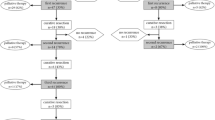Background and Purpose:
Radiochemotherapy (RChT) as adjuvant treatment for rectal cancer UICC stage II/III has been recommended by the National Cancer Institute (NCI) since 1991 and in Germany since 1994. Quality and results of postoperative treatment in day-to-day clinical practice in a complete region are evaluated retrospectively in a multi-institutional approach.
Patients and Methods:
534 patients from six institutions treated between 1993 and 1998 were evaluated. The institutions covered a complete region with radiotherapeutic care. Patients were staged as follows: UICC I 1%, II 28%, III 69%, and IV 2%. 92% received RChT, 8% radiotherapy (RT) alone. Median follow-up of patients was 47 months (17–91 months).
Results:
Only about 37% of expected patients were referred for postoperative treatment. The 5-year actuarial rate was as follows: local control 75% (63–84%), freedom from distant metastases 56% (44–63%), disease-free survival (DFS) 53% (42–59%), and overall survival (OS) 53% (45–64%). In multivariate analysis, local control was significantly influenced by T- and N-category, tumor grading, and RChT instead of RT alone. 6% (2–11%) of patients showed involved resection margins, in 33% of patients categorized pN0 less than the required twelve lymph nodes were examined, both leading to a significant decrease of local control.
Conclusion:
While the quality of adjuvant treatment followed consensus guidelines, the number of referred patients which was lower as expected and the inferior treatment results as compared to randomized studies indicate that the consensus recommendations for adjuvant treatment have not been fully accepted. Instead of patient referral according to UICC stage, patient selection by the surgeons has been performed according to individual risk factors. Efforts have to be made not only to improve treatment results in randomized studies but also to transfer and control these standards in daily practice.
Hintergrund und Ziel:
Die adjuvante Radiochemotherapie (RChT) des Rektumkarzinoms im UICC-Stadium II/III wird seit 1991 vom National Cancer Institute (NCI) und in Deutschland seit 1994 als Standard empfohlen. Die Qualität und Ergebnisse der postoperativen Therapie in der täglichen klinischen Praxis wurden flächendeckend retrospektiv untersucht.
Patienten und Methodik:
Insgesamt wurden 534 Patienten aus sechs Institutionen ausgewertet, die zwischen 1993 und 1998 behandelt wurden. Die beteiligten Kliniken versorgten strahlentherapeutisch flächendeckend den gesamten nordfränkischen Raum. Die Stadienverteilung der Patienten war: UICC I 1%, II 28%, III 69% und IV 2%. 92% erhielten eine RChT, 8% eine alleinige Strahlentherapie (RT). Die mediane Nachbeobachtungszeit der Patienten betrug 47 Monate (17–91 Monate).
Ergebnisse:
Nur etwa 37% der epidemiologisch erwarteten Patienten wurden entsprechend der Konsensvereinbarung einer postoperativen Therapie zugewiesen. Die Qualität der adjuvanten Therapie entsprach den gültigen Standards. Nach 5 Jahren betrugen die aktuarische lokale Kontrolle 75% (63–84%), die Freiheit von Fernmetastasen 56% (44–63%), das krankheitsfreie Überleben 53% (42–59%) und das Gesamtüberleben 53% (45–64%). Die lokale Kontrolle wurde in der multivariaten Analyse signifikant durch die pT-und pN-Kategorie, das Tumorgrading und eine RChT anstelle einer alleinigen RT beeinflusst. Bei 6% (2–11%) aller Patienten war nicht in sano (R1/2) reseziert worden; bei 33% der pN0 kategorisierten Tumoren wurden weniger als die geforderten zwölf Lymphknoten untersucht; beides führte zu einer signifikant reduzierten lokalen Kontrolle.
Schlussfolgerung:
Der niedrige Anteil an der adjuvanten Therapie zugewiesenen Patienten sowie die im Vergleich zu randomisierten Studien ungünstigeren Ergebnisse weisen auf die Auswahl eines Risikokollektivs hin. Anstelle einer stadienbezogenen Zuweisung scheint eine Auswahl mit individueller Risikoabschätzung durch den Chirurgen bevorzugt zu werden. Neben Therapieverbesserungen durch randomisierte Studien sollten ebenso Anstrengungen zur Übertragung dieser Ergebnisse in die flächendeckende Praxis unternommen werden.
Similar content being viewed by others
Author information
Authors and Affiliations
Corresponding author
Rights and permissions
About this article
Cite this article
Wulf, J., Krämer, K., van Aaken, C. et al. Outcome of Postoperative Treatment for Rectal Cancer UICC Stage II and III in Day-to-Day Clinical Practice. Strahlenther Onkol 180, 5–14 (2004). https://doi.org/10.1007/s00066-004-1175-8
Received:
Accepted:
Issue Date:
DOI: https://doi.org/10.1007/s00066-004-1175-8




